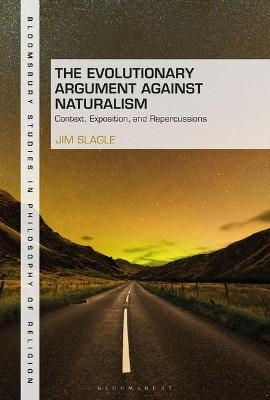
The Evolutionary Argument against Naturalism
Context, Exposition, and Repercussions
Seiten
2023
Bloomsbury Academic (Verlag)
978-1-350-24623-2 (ISBN)
Bloomsbury Academic (Verlag)
978-1-350-24623-2 (ISBN)
Contemporary discussions in metaphysics, epistemology and philosophy of mind are dominated by the presupposition of naturalism. Arguing against this established convention, Jim Slagle offers a thorough defence of Alvin Plantinga’s Evolutionary Argument against Naturalism (EAAN) and in doing so, reveals how it shows that evolution and naturalism are incompatible.
Charting the development of Plantinga’s argument, Slagle asserts that the probability of our cognitive faculties reliably producing true beliefs is low if ontological naturalism is true, and therefore all other beliefs produced by these faculties, including naturalism itself, are self-defeating. He critiques other well-known epistemological approaches, including those of Descartes and Quine, and deftly counters the many objections against the EAAN to conclude that metaphysical naturalism should be rejected on the grounds of self-defeat. By situating Plantinga’s argument within a wider context and showing that science and evolution cannot entail naturalism, Slagle renders this most common metaphysical view irrational. As such, the book advocates an important reconsideration of contemporary thought at the intersection of philosophy, science and religion.
Charting the development of Plantinga’s argument, Slagle asserts that the probability of our cognitive faculties reliably producing true beliefs is low if ontological naturalism is true, and therefore all other beliefs produced by these faculties, including naturalism itself, are self-defeating. He critiques other well-known epistemological approaches, including those of Descartes and Quine, and deftly counters the many objections against the EAAN to conclude that metaphysical naturalism should be rejected on the grounds of self-defeat. By situating Plantinga’s argument within a wider context and showing that science and evolution cannot entail naturalism, Slagle renders this most common metaphysical view irrational. As such, the book advocates an important reconsideration of contemporary thought at the intersection of philosophy, science and religion.
Jim Slagle is Adjunct Assistant Professor of Philosophy the University of Portland, USA.
Introduction
1. The Cartesian Dream
2. Quinean Tonic
3. Naturalized Epistemology Reformed
4. Terms of Engagement
5. The Evolution of the Evolutionary Argument
6. Elimination Game
7. The Probability Thesis
8. The Defeater Thesis
9. The End of the Argument
10. Analogies, Coherence and Evolution
11. Expanding the Target
12. Loose Ends
Bibliography
Index
| Erscheinungsdatum | 11.01.2023 |
|---|---|
| Reihe/Serie | Bloomsbury Studies in Philosophy of Religion |
| Verlagsort | London |
| Sprache | englisch |
| Maße | 156 x 234 mm |
| Themenwelt | Geisteswissenschaften ► Philosophie ► Allgemeines / Lexika |
| Geisteswissenschaften ► Philosophie ► Erkenntnistheorie / Wissenschaftstheorie | |
| Geisteswissenschaften ► Religion / Theologie | |
| ISBN-10 | 1-350-24623-9 / 1350246239 |
| ISBN-13 | 978-1-350-24623-2 / 9781350246232 |
| Zustand | Neuware |
| Haben Sie eine Frage zum Produkt? |
Mehr entdecken
aus dem Bereich
aus dem Bereich
die letzten Jahre der Philosophie und der Beginn einer neuen …
Buch | Hardcover (2024)
Klett-Cotta (Verlag)
CHF 39,20
Gesundheitsschutz, Selbstbestimmungsrechte, Rechtspolitik
Buch | Softcover (2024)
Kohlhammer (Verlag)
CHF 54,60
Jenseits von Identität | Ausgezeichnet mit dem Leipziger Buchpreis …
Buch | Softcover (2023)
Ullstein Taschenbuch Verlag
CHF 19,55


